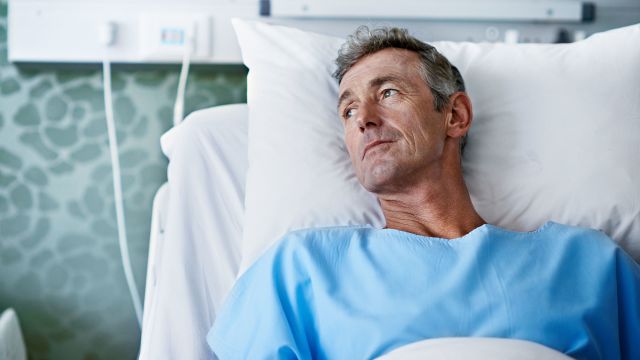A heart attack is a life-altering event. After one occurs, most patients know that their physical health will be affected, but they may not be aware just how much it may impact their mental wellbeing. Studies show that some degree of symptoms of depression occur in up to 33 percent of people who have experienced a heart attack—and that’s a problem because depression can delay recovery, especially if patients don’t seek treatment like cardiac rehab after their heart attack.
While nearly one-third of heart attack patients suffer from symptoms of depression, they often don’t recognize the signs or realize that there are many treatment options available. Poorna Nalabothu, MD, a cardiologist at St. Mark’s Hospital in Salt Lake City, Utah, shares why depression occurs after a heart attack, how cardiac rehab can help and what can be done at home.
Why is depression so common after a heart attack?
Heart attacks often occur without warning, completely changing a patient’s life, both in the short and long term. A heart attack can bring fears about mortality to the surface, as people will often worry how it may impact their longevity.
“Having an unexpected cardiac event, especially when people think they are healthy, can put them in a great depression,” says Dr. Nalabothu. “They also become anxious as to what it will lead to in the later part of their life.”
Immediately following a heart attack and during recovery, you may find yourself unable to perform activities or hobbies you typically enjoyed. Day-to-day tasks may also be difficult to perform while recovering. As a result, some patients become angry at their circumstances. They may withdraw from their family and friends and experience a lack of motivation. Others become fearful of a repeat cardiac incident.
The scope of the lifestyle changes patients must make after a heart attack can also feel overwhelming. “Keeping up with the new medications, the new symptoms and a strict diet is difficult,” says Nalabothu.
Life circumstances that caused chronic stress before a heart attack may also impact depression if they are not addressed following a cardiac event.
Signs of depression after a heart attack
Primary care physicians and cardiologists will often screen for the presence and severity of depression in patients following a heart attack with tools such as the Patient Health Questionnaire (PHQ). The PHQ consists of either two or nine questions and can be filled out by patients and discussed with a doctor.
Nalabothu uses the two-question format, also called the Short Patient Health Questionnaire, to start a conversation about depression with her patients, especially if she already suspects symptoms. The questions, which are also the first two in the nine-question screening tool, are as follows:
- In the past two weeks, how often have you been bothered by feeling down, depressed or hopeless?
- In the past two weeks, how often have you felt bothered by having little interest or pleasure in doing things?
Answering yes to either of these should prompt your doctor to recommend further evaluation.
There can be other indicators of depression as well. Nalabothu often asks patients if they are not interested in engaging in conversation with loved ones. “Some patients may be unable to sleep,” she notes. “Many have loss of appetite and some are not able to keep up with daily activities.”
Other symptoms of depression include:
- Irritability
- Trouble concentrating
- Feelings of worthlessness or guilt
- Lack of energy
- Weight gain or loss
- Thoughts of suicide
If you are experiencing any of these symptoms following a cardiac episode—especially thoughts of suicide—consult your primary care physician or cardiologist immediately.
Options for depression treatment
Following a depression screening, your cardiologist may refer you for treatment from a mental health professional. Based on the severity of the depression, they may suggest psychotherapy, antidepressants or a combination of both. Although patients may worry about interactions between their heart medications and antidepressants, studies have shown use of certain selective serotonin reuptake inhibitors (SSRIs) can be taken by some patients following a heart attack. Consult your doctors to get the correct drug recommendations for your situation.
Always make sure all of your doctors are up to date on which medications you are currently taking so you can avoid potentially dangerous drug interactions. Doctors should also monitor any behavior changes you may experience while taking antidepressants. Don’t stop taking your antidepressant unless directed by a doctor. If you feel your depression is worsening, let your healthcare provider know as soon as possible so you can try a different option.
Remember that treatment for depression is not a short-term fix. It may take a few tries to find a combination of therapy and an antidepressant that works for you. Discontinued or untreated depression is associated with greater mortality risk, lower rates of cardiac rehabilitation and reduced quality of life, so it’s important to stick with a treatment plan.
Where cardiac rehab fits in
Cardiac rehabilitation is medically supervised outpatient treatment, usually consisting of up to 36 one-hour long sessions, focusing on exercise, lifestyle changes and mental health, all personalized to your needs and recovery. Many think of rehabilitation as a physical activity, but sessions also focus on mental and emotional wellbeing. This can include support and counseling for depression. Members of your cardiac rehab team can also screen for depression throughout the recovery process.
Some cardiac rehab programs have mental health professionals on staff to work with patients and their medical teams. Together, doctors and mental health specialists can decide which treatment options will work best if a patient shows signs of depression. A study in the American Journal of Medicine found that depressed patients who completed cardiac rehab had a 73 percent lower mortality rate than depressed patients who did not complete rehab.
One of the reasons for the lower mortality rate was the impact of exercise in rehabilitation. “Cardiac rehab actually helps with physical strength, so the patients who work on exercise in cardiac rehab also have better outcomes in terms of depression,” notes Nalabothu. Even a small amount of exercise was found to have a positive impact on depression symptoms.
Nalabothu also notes that the social aspect of cardiac rehab can lead to better mental health. “Patients are more motivated because of the everyday interaction with their doctors and other patients,” she says. “They get to know other patients in rehab, so they bond with each other.”
The risk of untreated depression after a cardiac episode
Even though it is common to experience depression after a heart attack, patients may not realize they are affected. “Many never knew that they're depressed,” says Nalabothu. “They think they're just stressed and sad.”
Some patients also never receive screenings, leaving themselves and their physicians in the dark about their symptoms. “Physicians should have more awareness about screening as well,” suggests Nalabothu, “because unless the physician knows or suspects something, they may not look into the cause of depression.”
She also stresses that doctors need to ask about thoughts of suicide when talking to patients, and any suicidal thoughts should immediately be reported to your physician.
Untreated depression may hinder your recovery and impede your motivation to adopt a healthier lifestyle in a number of ways. Those who are depressed may fail to follow the medication program set forth by their doctor. They are more likely to skip cardiac therapy or find reasons to discontinue treatment. Patients may also be less motivated to change their diet or perform their prescribed physical exercises.
It’s worth noting that depression doesn’t always develop right after a heart attack. It may take months, so doctors should continue to screen for symptoms even after cardiac rehab is over.
Ways to stay motivated during recovery
“A healthier lifestyle definitely starts at home,” says Nalabothu. Aside from mental health treatment and cardiac rehab, patients can implement these strategies to help cope with depression and stay motivated to pursue their recovery.
Follow the plan outlined by your doctor. It’s crucial to follow the recommendations that your doctors and cardiac rehab team have provided for you. Continue to attend your cardiac rehab sessions. Take medications as directed, try to implement a healthy eating plan and do not try any exercises or tasks that haven’t been approved by a doctor. Following their advice can help you recover quickly.
Rely on your support system. Asking for help can be tough, but family and friends are usually happy to provide assistance through your recovery. “Lots of support from family is important,” says Nalabothu. “Have them take you to doctor’s appointments or look after you if you don't feel well. Have them help with home cooked meals.” She also suggests that patients should continue to socialize as they feel comfortable, which can include asking friends to help should they need it.
Find ways to reduce stress. Implementing relaxation methods can aid recovery from your heart attack while also tackling the symptoms of depression. Yoga, meditation, deep breathing exercises, music and finding distraction in hobbies are all ways you can handle stress. Be easy on yourself, both mentally and physically, in the time following your heart attack. If you are not sure what triggers your stress, start tracking it daily on the Sharecare app (available for iOS and Android). Figuring out what upsets you may help you to develop effective coping strategies.
Stay positive and be patient with recovery. The goals of cardiac rehab are to improve your health, restore heart function and get back to safely performing as many of your daily tasks as possible. The amount of time needed varies for everyone. Don’t become discouraged if it takes longer than you expect and don’t quit.
Medically reviewed in May 2018.






